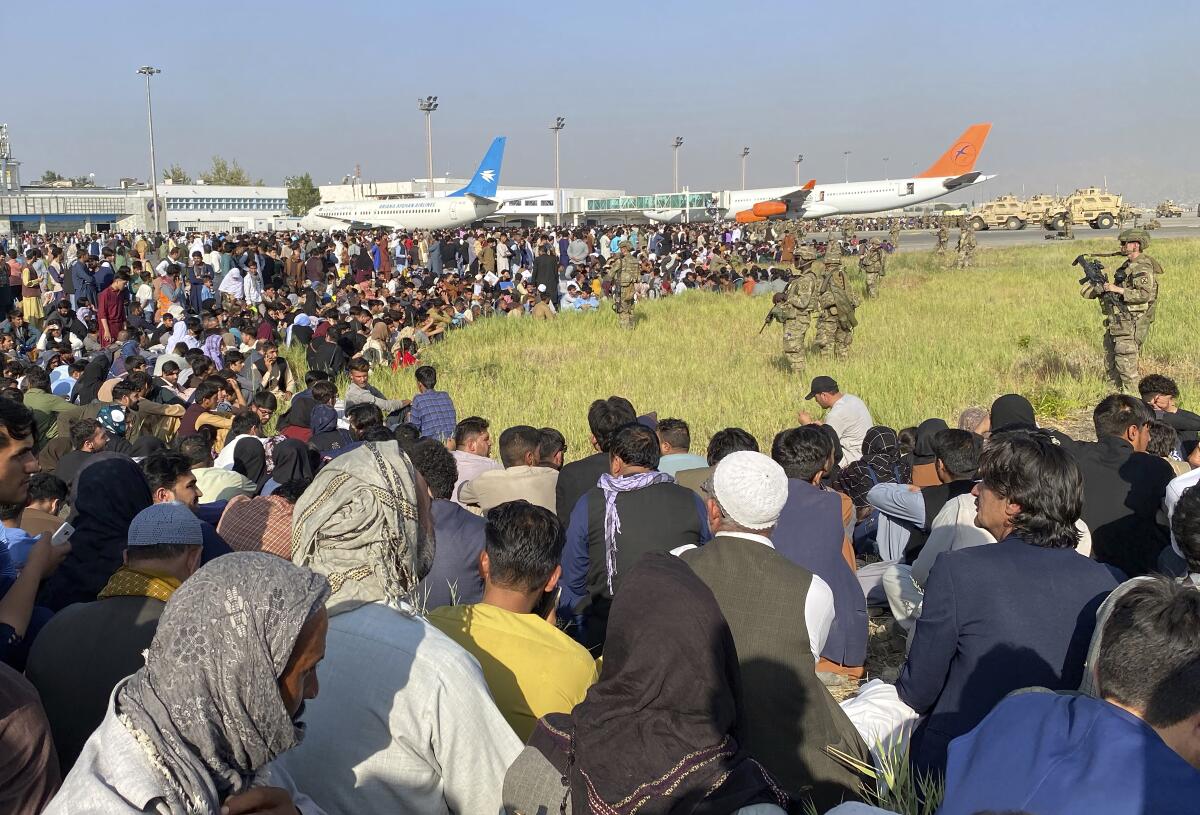After Afghanistan, readers ask: Will America finally learn from history?

- Share via
A vassal state falls to an indigenous political movement, resulting in chaos locally and the departing occupier weakened after decades of military conflict and money spent on enriching oligarchs as much as sustaining infrastructure and institutions. For people of a certain age, this conjures memories of the U.S. fleeing Vietnam or states in Eastern Europe breaking free of Soviet domination.
Most recently, from an American point of view, this describes Afghanistan, another country “lost” by a dominant power. When the U.S.-backed government fell and the Taliban took control of Kabul on Sunday, hastening President Biden’s promised withdrawal of American forces, most of our letter writers reacted by expressing sadness and anger over the scenes of chaos in the Afghan capital and the mortal danger in which many women, children and civilians who assisted U.S. personnel suddenly found themselves.
A smaller set of readers tried to put Afghanistan into context, with ample examples from recent history. Some of their letters are below.
————————————————
To the editor: Everyone seems to be comparing the debacle in Afghanistan with Vietnam. I think they’re wrong — the comparison should not be with Saigon in 1975 but with Tehran in 1979.
Then, as now, the U.S. government found itself wrong-footed because it failed to read the mood of the country as a whole rather than just listening to a relatively small Western-oriented elite. Our policies were shaped not to the needs of the country, but with wider geopolitical concerns (now, the need is to “contain” Russia and China).
Our policies toward Iran are still based on unremitting hostility, a Cold War mind-set and a sanctions regime designed to punish the population. Despite this, the Islamic Republic of Iran has survived, and it is likely that Afghanistan will follow a similar course.
Afghanistan isn’t just a single point of failure in our foreign policy. It underscores our policy shortcomings in the whole region, from the Middle East to India. We need to rethink our regional goals and methods, because whatever we’ve been doing just isn’t working.
Martin Usher, Thousand Oaks
..
To the editor: U.S. support of the corrupt Batista regime in Cuba led to Fidel Castro. U.S. support of the corrupt Diem and Thieu regimes in South Vietnam led to a communist takeover. U.S. support of the Iranian shah led to Supreme Leader Ayatollah Ruhollah Khomeini.
Most recently, U.S support of the corrupt regimes in Kabul led to the resurgence of the medieval Taliban.
Time and again, U.S. government hopes that deeply corrupt regimes will flower into liberal democracies with enough American dollars and military assistance have set those countries back for generations. When will we learn?
Michael Armstrong, Hawthorne
..
To the editor: While many make the comparisons of the current retreat from Kabul and that of Saigon in 1975, an equally frightening comparison is the 1842 British retreat from Kabul.
Under a brutal siege by local tribesmen of the 4,500 British and empire troops with 14,000 civilians, Maj. Gen. Sir William Elphinstone ordered an overland retreat to the British garrison at Jalalabad. The retreating caravan was promised safe passage, but it was nevertheless attacked.
One of the worst massacres in military history resulted. Only one British survivor and a handful of sepoys are said to have reached Jalalabad. Survivor William Brydon was asked, “Where is the army?” He answered, “I am the army.”
This is the reason Afghanistan is referred to as the “graveyard of empires.”
Cary Adams, North Hollywood
..
To the editor: Twenty years made no difference. That is the Afghanistan war. It was not an experiment in democracy. It was a shameful moneymaking venture, like all wars are. It’s another American disgrace that will haunt the cemeteries where our soldiers are buried.
We are no smarter, wiser or more self-aware than after any war that came before. We don’t have an obligation to force our way of life on the rest of the world. Who came up with this nonsense? It’s flawed thinking like this that has led us to another shameful moment in history.
We march into countries, convincing them we know best. But do we really? Look around. Look at the tents strewn block to block in every major city in America.
If I were a U.S. soldier today, I would walk out in protest. Because it’s the American soldier who has been sold a bill of goods.
Lisa Harmon, Yakima, Wash.
..
To the editor: So many commentators are asking about Afghanistan, “How can our allies ever trust us again?” These experts talk as if not trusting the U.S. is a bad thing.
Since the Eisenhower administration, the United States has successfully rallied our allies to reinforce some of the most ill-conceived military follies in modern history. We rallied our allies to war in Vietnam. We rallied our allies to invade Iraq. We rallied our allies to invade Afghanistan.
Just imagine how much better off the world would have been if our allies had not trusted us over these disastrous 60-plus years, and imagine how much better off the world will be when our allies cease trusting the United States.
Fred Gober, Playa Vista
More to Read
A cure for the common opinion
Get thought-provoking perspectives with our weekly newsletter.
You may occasionally receive promotional content from the Los Angeles Times.










